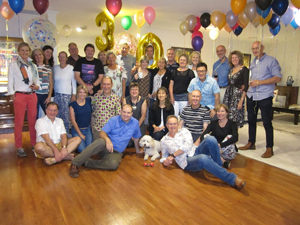
A couple of weeks ago I spent 30 hours in transit flying to Australia to attend my 30-year veterinary school reunion. I figured it was one hour per year (I'm really good at math!). Thinking about this, and enduring the flight itself, made me feel old. We try to kid ourselves that we are “just the same as we were when we entered the workforce,” but the cruel reality, plainly displayed in our class photos, is that we’re typically fatter, balder - and if not balder, then greyer - and more wrinkled than our self-image leads us to believe.
Of the 50 classmates who graduated with me in 1987, about 30 attended the reunion, sans spouses; there’s generally nothing more boring for a spouse than to listen to to other people's stories about college days, so with a few exceptions, we spared them the grief. While it was fun to catch up with people who I hadn’t seen for quite a while ― some since graduation ― what struck me were the paths my compatriots had traveled after taking off their graduation robes and throwing aloft their mortarboards.
After unanimous agreement that I had “married up” and questions about my wife’s sanity in deciding to marry me, we got to chatting about where life had taken us.
As might be expected, the slim majority are in general practice, and several own one or more practices. Some work with small animals, some with large animals. They're still livin' the dream, doing what almost all of us had set out to do when we decided to become veterinarians. One deals almost exclusively with exotic pets, focusing on reptiles and amphibians. Some 20 percent held academic positions for at least a while; at least five are still in clinical academia as specialists in equine surgery, anesthesia, clinical pathology, cardiology (that's me) and emergency medicine. Indeed, when I counted the number of classmates who had gone on after graduation to get an advanced clinical certification or other degree (MBA, Master’s degree, PhD etc), I was surprised and impressed. At least 25 percent of my class had done so at some point.
You might consider clinical academia pretty similar to practice as we’re still mostly seeing patients and dealing with animal diseases. To that end, we have at least three specialists in practice in our ranks: a dermatologist, a fish specialist, a third is a dairy consultant. We have two practitioners working with non-for-profit organizations, such as the Guide Dogs of Victoria, and until recently one was a veterinarian in a large wildlife sanctuary; he is now coping with his mid-life crisis by starting a PhD. We have a colleague who established a successful sheep artificial insemination and embryo transfer business. Most of us are still in the broad field of animal health, with a few notable exceptions. One is a successful, full-time author who still dabbles occasionally with animals. One is a CEO of a drug company. A couple have left the profession altogether; one became a human nurse and the other decided to stay home with her kids.
But even those who have remained veterinarians at heart have broad and varied careers. One is an executive for an international pet food company. Another works in Myanmar as a chief technical advisor of the Food & Agriculture Organization of the United Nations. One colleague runs a fisheries consulting firm, helping fisheries improve farming and harvesting standards. In the same vein (excuse the phlebotomic pun), one colleague is setting up a mobile slaughterhouse that comes to the small farm to minimize stress to animals, reduce the costs of transportation to the farmer, and improve the quality of the meat being produced. Another, after years in academia, has embarked on improving equine welfare in developing countries.
As I sat chatting with classmates, I realized that our class truly epitomizes what it is to be a veterinarian. I was impressed at how we have used our training to advance animal health in a myriad of ways. We have been fortunate enough to find niches that fuel our passions. Most of us have at least tried mainstream veterinary practice, but many have then embarked on other veterinary adventures. We are so much more than the character portrayed by James Herriot that likely inspired us to become veterinarians. And so, I raise a glass to my class and say, “Here’s to the next 30 years!”